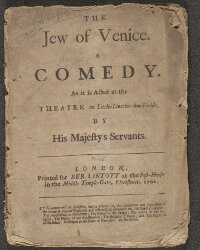A comedy. As it is acted at the Theatre in Little-Inn-Fields, by His Majesty’s servants
George Granville, Lord Lansdowne
London: Printed for Ber. Lintott at the Post-House in the Middle Temple-Gate, Fleetstreet. Prologue by Bevil Higgons, 1701
This adaptation of the Merchant of Venice includes a prologue in which the ghosts of Dryden and Shakepeare “arise Crown’d with Lawrel” to discuss current theatre. Dryden disdains English audiences who only want to see French farces about men loving men or women pursuing women. Shakespeare says “these crimes” were unknown in his “less polished age.” Some commentators have interpreted this scene as an attempt to impose eighteenth-century morals on Shakespeare and quash any notion of the homoerotic in his works. In another eighteenth-century imposition, Shakespeare is made to praise his emendators, who have “adorn’d and refin’d” his “rude Sketches.” —VH
